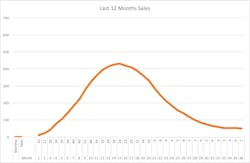In any company, the development and introduction of new products is critical to building a firm foundation for the future. It’s complicated, and it’s important to measure how it’s going, so winners can be supported and losers can be weeded out before they consume more resources.
So: how best to do that?
I once had a sales manager who was proud of his skill with new products, and under his leadership we substantially increased the attention we paid to this topic. Curious about how well we were doing with a particular product that we’d spent a lot of money on, I asked him to prepare a report on its sales month-by-month. Soon after, he came to me with this report:
It was pretty impressive! Soon after its introduction, the product had taken off, growing rapidly. I asked him how it was doing now, and he told me that it had “settled down a little.” I asked him to prepare another report, looking not at cumulative sales, but only at the last 12 months. That took a while. In fact, I had to ask for it several times, and explain to him repeatedly the information I wanted, and how to get it. Here’s his revised report:
This told an entirely different story! The product hadn’t “settled down a little;” it had collapsed! So now we had to have a whole new conversation. We needed to decide whether it was even worth keeping in the line!
This blog is about the art of measurement, and this is an excellent example of it. Measuring things in your business is critical, and I always advocate simple measures that can help you understand what’s going on. But this is a cautionary tale. You must be sure that simple measurements aren’t misleading; that they reveal the truth, rather than obscure it.
My advice is simple: in constructing a measurement, be sure that it can tell you the WORST news about the topic at hand. The objective shouldn’t be to congratulate yourself on your brilliance, but to provide an early warning of problems before they grow out of control. It’s important to measure — but it’s even more important to measure the right things!



